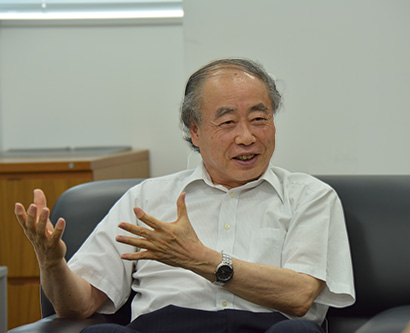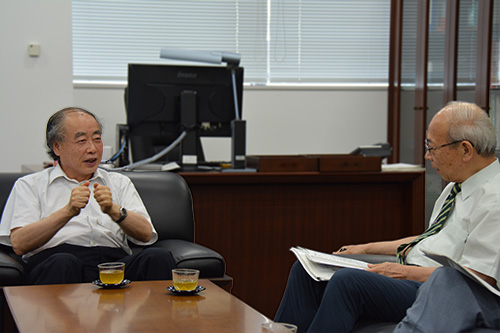[Interview] Emeritus Professor Kobayashi, Makoto No. 1


The Role Expected of Universities as "International Research Centers" to Realize Nobel Worthy Outcomes
Interlocutor
- Kobayashi, Makoto (Emeritus Professor)
- Okada, Yashunobu (President)
- Nagayama, Kuniaki (Executive Director)
Nagayama: Hello, my name is Nagayama. I am the chairman of SOKENDAI and will serve as moderator today. Although there is no need to introduce Dr. Kobayashi, I'll offer a brief summary: After proposing the Kobayashi,Masukawa Theory in 1973 to explain the CP Violation, he was appointed in several universities. He was awarded the Nobel Prize in Physics in 2008, when he was in SOKENDAI. Currently, he is the director of the Research Center for Science Systems at the Japan Society for the Promotion of Science.
What role are universities expected to play in nurturing Nobel Prize winners? Free thought and diversity generate academic possibilities.
Okada: Congratulations on receiving the 2008 Nobel Prize in Physics. We are delighted about your success. The first subject we want to ask you about is how you spent your days as a graduate student, which might have laid the foundation for receiving this prize. Where and how did you acquire the basic essential academic skills?
Kobayashi: I think having received my graduate education at the Nagoya University Department of Physics played an important part. I entered graduate school hoping to study Fundamental Particle Theory with Dr. Sakata, whose laboratory became vital to me.
To describe the atmosphere in Dr. Sakata's laboratory in one word, I would use "freedom." We had a very free relationship among junior and senior colleagues and with Dr. Sakata as well. I did not stay in my own room, but spent most of my time in the "colloquium room," which was sort of a conversation area. Also, at that time, the entrance exam dates for graduate schools varied among schools. Students were able to take exams for many schools; as a result, similar to other schools, Nagoya University had many graduate students who came from other universities. The atmosphere there allowed us to speak freely with many different people about a variety of topics.
Okada: That sounds wonderful. I think one of the biggest problems today in Japanese higher education is the lack of fluidity. When I was a student, the topmost elite goal was to graduate from a national university, enter graduate school, become a post-doc, then an assistant professor, and finally, a professor. In comparison, movement is highly valued in the west. I think experiencing different cultures can prompt new ideas; thus, Japan is missing a lot by lacking fluidity. It appears that Dr. Sakata's laboratory was quite open in that regard.
At SOKENDAI, we are trying to build an educational system where students from different universities with completely different specialties can learn techniques by interacting with other fields through collaborative research. This would include internship-type approaches, and we are hoping to initiate this program from the third term of the midterm objectives and planning period, although it is another issue whether we will be given the necessary government funding to support this cause.
Kobayashi: That really is a serious issue for any university today. Decreases in the overall fundamental budget constrains the research freedom that arises from free-thinking academic environments. This is extremely problematic for the future of the sciences. However, how to value this freedom is an issue that speaks to the very foundation of our principles, and this can make it difficult to discuss this topic or to convince the opposition of its merits.
Okada: We are constantly pressured to consider the "outcome" of our research, i.e., to generate results that will immediately contribute to society or industry. However, in fact, new industries that contribute the most to society often originated from a free-thinking basis, where no one at the time even considered whether or not the result might be put to practical use. Although there is, of course, a degree of time lag, perhaps 10 years or so, the sciences nurture seeds that have a tremendous impact on the world. Investing only in research that is nearest to generating a desired "outcome" may be productive in the short run, but in 10 or 20 years' time, Japanese society and industry would be seriously compromised.
Kobayashi: I agree with you completely. Outcomes that expand the sciences are born only from freedom and diversity. Setting certain "directions" in advance is definitely counterproductive.
Okada: In this respect, JSPS has been a strong ally in supporting fundamental academic research. I myself have received support from the Grants-in-Aid for Scientific Research, and am truly grateful. What are some of JSPS' future plans?
Kobayashi: We are actually trying to implement a tremendous change in the Grants-in-Aid for Scientific Research system, and everyone is taking on big tasks, and engaging in heated debates in the process. We will also be reconsidering the "List of Categories, Areas, Disciplines, and Research Fields" in fiscal year 2018. So, we will implement big changes in the categories and reviewing procedures at that time. We have some concerns about how scholars will react to these changes, but hope the merits of the changes will be clear.
What is most important for universities today that are facing internationalization? Maintaining the Japanese edge while accepting post-docs and students from abroad.
Nagayama: How is the JSPS system working for students from abroad? I think fewer and fewer Japanese will enroll in Ph.D. programs. Any thoughts on how to handle this situation?

Kobayashi: JSPS has no programs that directly target foreign students, but there are some programs for higher career-level researchers, such as the Postdoctoral Fellowships for Foreign Researchers. Regarding the internationalization of Japanese universities, it is critical to accept many students and post-docs from abroad; only then will we become an international stronghold.
Okada: Although "internationalization" is often misconceived as merely doing things in English, I do not think that is the only aspect. At SOKENDAI, we are hoping to implement efforts such as teaching Japanese to foreign students. I would also like to ask you about issues related to the Japanese language. Did things such as national characteristics that come from using the Japanese language, or the Japanese way of thinking have any positive effects on your academic accomplishments?
For example, although I am an amateur in your field, I feel that there are two approaches, the Sakata-style experiential approach and the western style, and that eventually, the experiential approach succeeded. I believe that perhaps this substantialism and the Japanese sense of esthetics that does not necessarily find beauty in symmetry could have had some influence on the result. This is only my impression as a layperson, but what do you think?
Kobayashi: That is a very difficult question. I have not been on the other side, so I can't really say. I do not have the experience of long-term study abroad. The way of thinking in Dr. Sakata's group in the 1960s was a bit different from the rest of the world, so by learning in such an environment, I picked up their way of thinking. On the other hand, in the basic aspects of Fundamental Particle Theory, the so-called Gauge Theories advanced substantially at the time. I was able to acquire both aspects as a student, and that may have had a synergistic effect. I can't really say for myself how "Japanese" my way of thinking is, but I suppose generally speaking, thought depends on language.
I completely agree with you in that homogenizing the world by doing everything in English is undesirable. With respect to local characteristics and diversity, we must ensure that such things endure and are honored. Language barriers will always exist, and should be respected as just that. However, it's also true that we need English for global communication. I think it's a matter of balance.
p.1/2
Related Content
